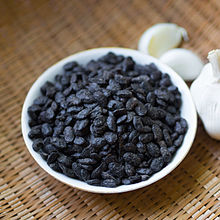 A close-up of douchi | |
| Alternative names | Fermented black soybeans, Chinese fermented black beans, salted black beans, salty black beans |
|---|---|
| Place of origin | Chinese |
| Main ingredients | Fermented soybean |
| Douchi | |||||||||||||||||||||
|---|---|---|---|---|---|---|---|---|---|---|---|---|---|---|---|---|---|---|---|---|---|
 "Douchi" in Chinese characters | |||||||||||||||||||||
| Chinese | 豆豉 | ||||||||||||||||||||
| Hanyu Pinyin | dòuchǐ | ||||||||||||||||||||
| Jyutping | dau6-si6 | ||||||||||||||||||||
| |||||||||||||||||||||
Douchi[a] is a type of fermented and salted black soybean most popular in the cuisine of China, where they are most widely used for making black bean sauce dishes.[1][page needed]
Douchi is made by fermenting and salting black soybeans. The black type soybean is most commonly used and the process turns the beans soft, and mostly semi-dry (if the beans are allowed to dry). Regular soybeans (white soybeans) are also used, but this does not produce "salted black beans"; instead, these beans become brown. The smell is sharp, pungent, and spicy; the taste is salty, somewhat bitter and sweet. [citation needed] The product made with white soybeans is called mianchi.
Douchi, "Chinese salted black beans", and "black soybeans" are not the same as the black turtle bean, a variety of common bean that is commonly used in the cuisines of Central America, South America, and the Caribbean.
Cite error: There are <ref group=lower-alpha> tags or {{efn}} templates on this page, but the references will not show without a {{reflist|group=lower-alpha}} template or {{notelist}} template (see the help page).
- ^ Shurtleff, W.; Aoyagi, A History of Fermented Black Soybeans (165 B.C. to 2011). Lafayette, California: Soyinfo Center, 2011